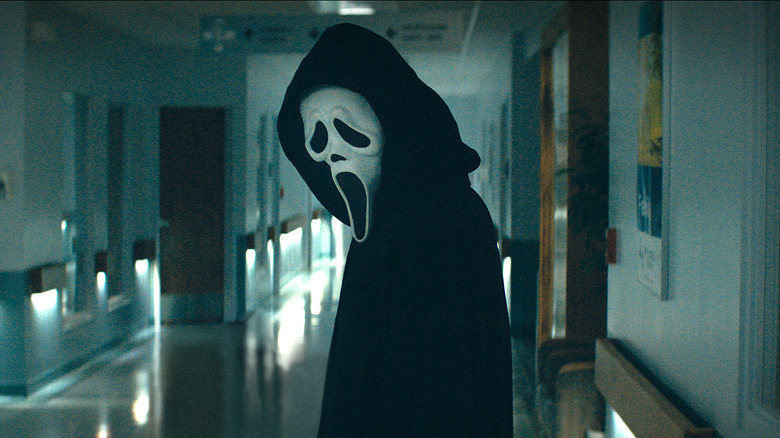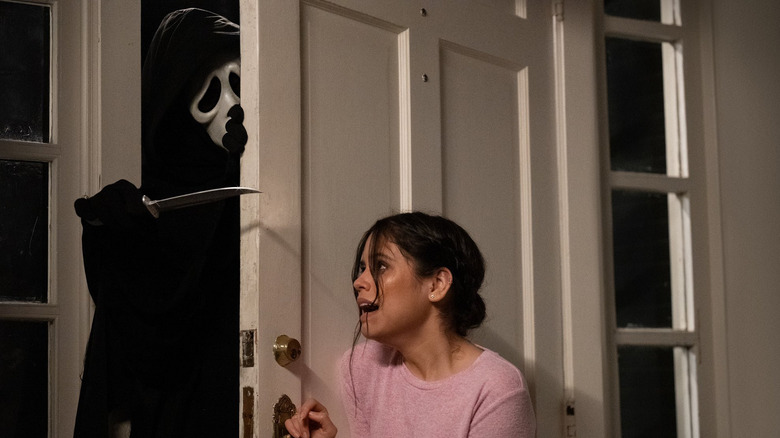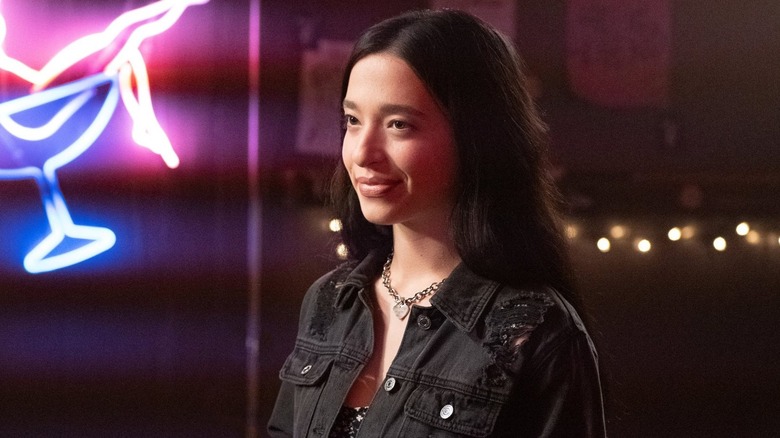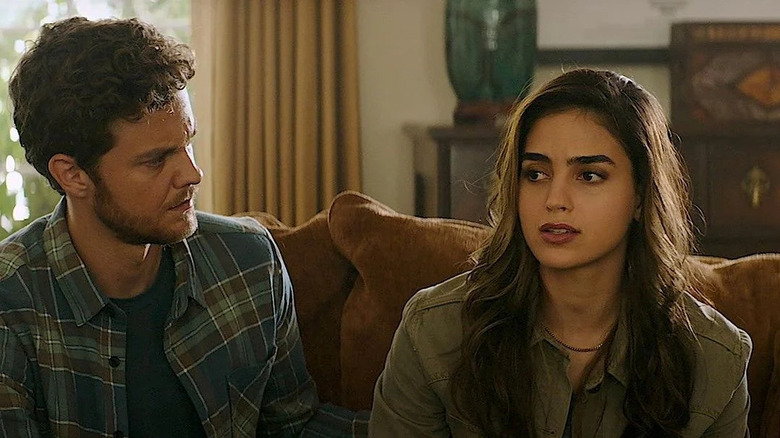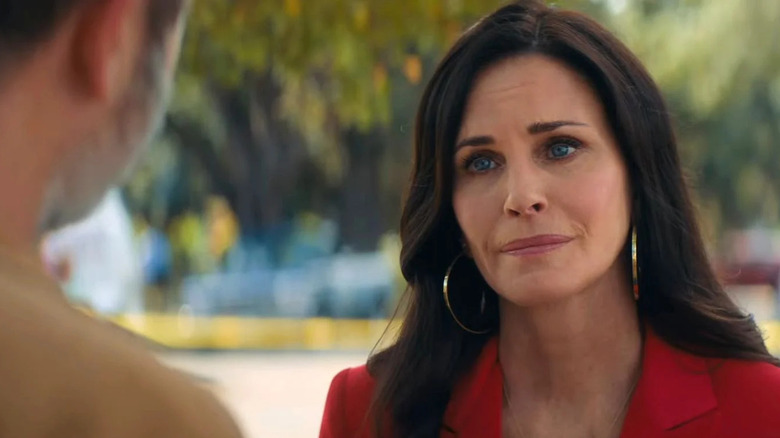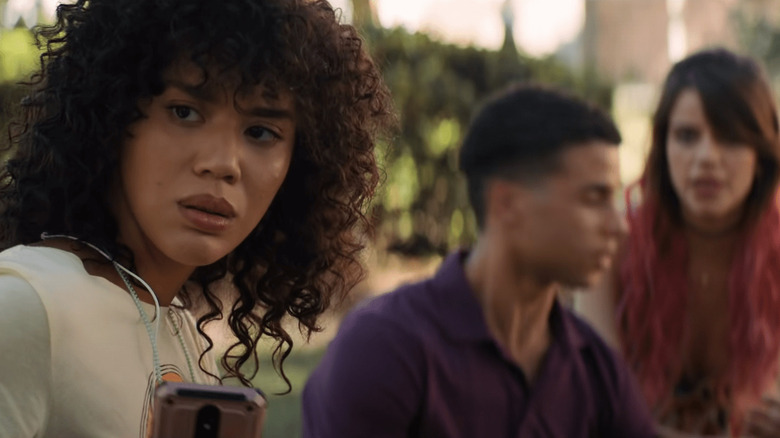Scream Ending Explained: Somebody Has To Save This Franchise
Put the phone on silent and unplug any landlines, there's a new "Scream" out. Directed by Matt Bettinelli-Olpin and Tyler Gillett with a screenplay penned by James Vanderbilt and Guy Busick, "Scream" (2022) has landed on the big screen with red herrings and aired dirty laundry as a body count stacks up.
Though the series began and continues with Sidney Prescott (Neve Campbell), Gale Weathers (Courteney Cox), and Dewey Riley (David Arquette), a new generation emerges in the franchise's fifth entry to continue the battle over control of personal narratives. Sam Carpenter (Melissa Barrera) is back in Woodsboro, lured to return for her sister, Tara (Jenna Ortega), the survivor of a vicious knife attack by an assailant dressed as Ghostface. With their resurfacing, Ghostface's presence once again turns Woodsboro into the town that dreaded sundown, particularly if you're connected to the events of Wes Craven's original 1996 banger "Scream."
The "requel," explained by one of its characters as a combination of a reboot and a sequel, has its own rewards in addition to its own rules. The Paramount-Spyglass Media presentation banked $3.5 million from its Thursday night showings spread across three thousand-odd theaters, Deadline reports. It looks on track to have a successful weekend, further signaling to studios that not only is horror alive and well, but a worthy investment, pandemic or not. A lot went down within the movie's 114-minute runtime, and /Film is here to unroll the highlights and chew on the implications.
It should go without saying that a discussion of a slasher-mystery's conclusion will include spoilers, but this writer was tut-tutted by a horror fan last week for ruining the ending of the forty-five-year-old classic "Carrie," so it seems that hand-holding is necessary here. Apparently, if I'm right about this, I could save a fan's life. "Do you know what that could do for my book sales?!"
Everybody's A Suspect
Because the Scream films function as both slashers and whodunits, it's pertinent to list the who's before getting to the dunits. Those reading this ending explainer already know the legacy characters Sidney, Gale, and Dewey, plus Billy (Skeet Ulrich) and Stu (Matthew Lillard) of the first film. The list of suspects and victims center around the following group of Woodsboro friends:
- Sam Carpenter (Melissa Barrera): Sam is Tara's older half-sister and Billy Loomis' daughter. Sam sees visions of her digitally de-aged killer dad as he was in the climax of "Scream" and fears that she'll turn into him one day, to the point of ghosting her family and skipping town for years before Tara's attack compels her to return.
- Richie Kirsch (Jack Quaid): Richie is Sam's boyfriend of six months. He seems protective of his girlfriend, refusing to leave her alone for any lengthy period of time.
- Tara Carpenter (Jenna Ortega): Tara is Sam's younger sister; the film opens with an attack that leaves her with a broken leg and multiple stab wounds. She resents Sam for abandoning her, but after a second attack in the hospital, she appreciates her sister's presence.
- Amber Freeman (Mikey Madison): A friend to Tara especially, staying with her in the hospital following the initial attack and ensuring Tara has her extra inhaler. Amber, it turns out, lives in Stu Macher's old house, the same house where a bloodbath occurred at the climax of "Scream" '96.
- Chad Meeks-Martin (Mason Gooding): A letterman jacket-sporting jock at Woodsboro High, fraternal twin brother of Mindy, nephew of Randy Meeks, and horny boyfriend of Liv.
- Mindy Meeks-Martin (Jasmin Savoy Brown): Genre expert at Woodsboro High, fraternal twin sister of Chad, and niece of Randy Meeks. It is Mindy who lists the rules of the requel and points out that the killer is attempting to connect the old with the new by targeting those with a link to the town's past, like the death of Vince (Kyle Gallner), who shares a kinship with o.g. "Scream" co-killer Stu.
- Liv McKenzie (Sonia Ben Ammar): The girlfriend of Chad and one-time hookup with Vince.
- Wes Hicks (Dylan Minnette): The son of Sheriff Judy Hicks, who also returns from "Scream 4."
Now that the main players are established, onto the grand stage.
'Welcome to Act Three'
Of these friends, Wes is the first to go, after his mother; both are stabbed in broad daylight. Amber plans a memorial get-together in his memory, which looks like a raging house party. Meanwhile, the tragic death of Dewey and the second attack on Tara is the final straw for her sister, who decides it's time to get out of dodge. With Richie at the wheel, they start to drive out of Woodsboro but realize that Tara's inhaler is missing; wouldn't you know it, Amber's got the extra one, so they make a detour to the party. Sidney and Gale are not far behind, having put a tracker on Sam's car.
After the majority of the guests clear out, Chad and Mindy are both attacked and Ghostface disappears right when Liv appears with blood on her hands, claiming she found Chad. This is the first killer reveal, when Amber pulls out a handgun and shoots Liv, shooting Gale moments later upon her arrival with Sidney. The other killer turns out to be Richie, the very love interest that Dewey warned to be wary of earlier in the film.
Every "Scream" has a hefty villain monologue or two, unpacking their motives for the murders. Here, Amber explains that the two were livid over how the film-within-the-film "Stab" movie franchise (based on the Woodsboro massacre of the 1996 film) had been going. As Richie explains, the best "Stab" movies are based on true events, and so the pair orchestrated the attack on Tara to draw Sam back and revive the fictional franchise.
Following some scuffle, Amber is doused in hand sanitizer and inadvertently lit aflame. Richie makes the mistake of fanboying in Sam's mentions, prompting her to remind him to "never mess with the daughter of a serial killer." She proceeds to shank Richie multiple times, slash his throat, and put some bullet holes in him for good measure. Amber is the killer who comes back for one last scare in the most gorgeous shot of the movie; screeching like a banshee and hurtling towards the camera with kitchen knife raised. The "Stab" stan is shot by Tara and doesn't get up again. The saga concludes with Gale, Mindy, and Chad's miraculous survival, some encouraging words from Sidney, and the restored relationship of the Carpenter siblings as they leave for the hospital together.
The dedication before the end credits reads, "For Wes."
We Need To Talk About Sam
In discussions around the film so far, one common complaint is that Sidney isn't around as much, and it's a fair observation; the legacy character doesn't have much impact on the story itself. But as a complaint, it's shaky: do we really need to insist that Sidney takes center stage again? Do we insist that she defends her control over her narrative again? Why, in 2022, should she still have to answer for the sins of her mother?
As Mindy asserts, this is a requel, a bridge between the old guard and the new blood. It makes sense for the next generation to be the ones to provide the "source material" for Ghostface (whoever may be under the mask), and Sam's dear old dad Billy Loomis has done far worse than Sidney's mom ever did. The daughter of a killer would certainly have organic damage that stems from her parentage, and in a franchise that had Sidney punished for the sins of her mother (Maureen Prescott had extramarital affairs with Cotton Weary and Hank Loomis), Sam is a solid character for scribes Vanderbilt and Busick to craft. As she claims the life of her ex and assailant, Sam is either unleashing a dark side she inherited from Loomis or acknowledging her origins and weaponizing it as a strength, depending on your interpretation of the line she spits as she brings down the blade.
At the end of the film, when the killers are being loaded into body bags and the survivors are being loaded into ambulances, Sam peers into a car window and sees Loomis alongside her reflection, nodding in approval. This writer's opinion is that this skates too close towards the original killer being given a redemptive arc, but up until then his utilization is strong in tandem with Sam, similar to how Maureen cast a specter-like presence over Sidney in "Scream 3," to the point of the heroine seeing visions of her late mom. This is a series of tales in which others set forth a narrative for a young woman, including herself, based on her past and lineage; it is continuously up to her to reclaim that portrayal and ultimately, her own legacy. In order to evolve the story for the incoming class of horror heads, Sidney & Co. must pass the torch (or the phone).
Atta Girl, Gale
"Scream" redux is made in such a way that another sequel doesn't need to happen (but if the box office returns sing a tune sweet enough, another one will probably come down the pike). There are few lingering questions, but plenty of satisfying conclusions and continuations for those who have followed the movies from day one.
Most notable is Gale Weathers, who began the film series as a crime-chasing reporter whose first and only priority was being first on the scene and getting the scoop, no matter who she had to step on. When a young deputy Dewey points out that Ghostface would have to kill a few more people to be designated a serial killer, Gale grins and croons, "Well, we can hope, can't we?" In her defense, she likely wouldn't have gotten her role at the "Top Story" outlet, become a bestselling author, or (in nu-"Scream") gotten her own morning show if she wasn't so persistent and aggressive, but her constant mining of tragedy for professional gain resulted in a strained relationship with Dewey; the pair married in one sequel, divorced in another, and (sort of) reconciled before the former sheriff's murder.
But a shift occurred as she became personally entangled within the Woodsboro drama. The denouement of "Scream 2" sees the reporter opting to accompany Dewey to the hospital rather than immediately jump in front of a camera as she did at the end of the first film. The middle sequels have Gale jumping in to actively solve the murders, and it all builds to the satisfying growth she displays in the latest film; after enduring countless quips about the murders making great chapters in her next book, Weathers decides that this pair of murderers don't deserve the page space, grunting that they can "die in anonymity."
Finally, it's no longer about the clout.
'Somebody Has to Save the Franchise.'
On a macro level, "Scream" (2022) pays off previous "Scream" movies by giving them a new coat of polish. When Drew Barrymore's Casey Becker was asked about favorite scary movies in 1996, the platinum blonde cited '70s and '80s classics and not much more recent. This is partly because "Scream" (1996) was released amid a stagnant period for slashers: just the year prior, Michael Myers' sixth film had him involved in a cult, and three years prior Jason had to go all the way to Hell to get fans to the box office. The slice 'n dice landscape needed a reset, and two came courtesy of Wes Craven with "Wes Craven's New Nightmare" and "Scream."
Nouveau-"Scream" finds purchase with the next generation the same way Kirby (Hayden Panetierre) does in "Scream 4" — by updating the film catalog, partly because the past decade has observed a boon of fantastic horror that Tara and Mindy cite zealously. Among others, "The Babadook," "Hereditary," "It Follows," and Jordan Peele all get praise, tracking with the cinema commentary that has marked every previous "Scream" film. Even Amber, as a co-killer, essays the maniac critical energy of Timothy Olyphant's film bro Mickey Altieri in "Scream 2," both weaponizing trivia knowledge and designating themselves saviors in the name of genre.
With spittle oozing from her lips, Amber sneers, "Somebody has to save this franchise." Richie goes on to claim, "How can fandom be toxic? It's about love," after stabbing several people to death to foment a sequel. It's a stellar — and if you have stepped into the dumpster fire of comments on any franchise film on social media, relevant — commentary on both slashers and the culture surrounding them.
The fifth entry in the Woodsboro journey is a messy one, but its messages are as appropriate for the era as Wes Craven and Kevin Williamson's were twenty-five years ago.
It's a scream, baby.
